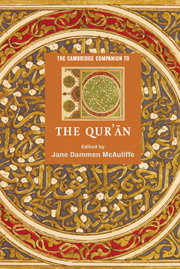Book contents
- Frontmatter
- Introduction
- Part I Formation of the Qur'ānic text
- Part II Description and analysis
- Part III Transmission and dissemination
- Part IV Interpretations and intellectual traditions
- Part V Contemporary readings
- 12 Women’s readings of the Qur'ān
- 13 Political interpretation of the Qur'ān
- 14 The Qur'ān and other religions
- Qur'ān Citation Index
- General Index
13 - Political interpretation of the Qur'ān
from Part V - Contemporary readings
Published online by Cambridge University Press: 28 March 2007
- Frontmatter
- Introduction
- Part I Formation of the Qur'ānic text
- Part II Description and analysis
- Part III Transmission and dissemination
- Part IV Interpretations and intellectual traditions
- Part V Contemporary readings
- 12 Women’s readings of the Qur'ān
- 13 Political interpretation of the Qur'ān
- 14 The Qur'ān and other religions
- Qur'ān Citation Index
- General Index
Summary
THE QUR’ĀN AS A POL I T ICAL FACTOR IN PRE-MODERN TIMES
After the 'emigration' (hijra) from Mecca to Yathrib (later Medina) in 622 CE, the Prophet became the acknowledged leader of a community. A fair number of Medinan passages in the Qur'ān are, therefore, of direct social and political relevance. Rules of conduct in relation to other religious groups, most notably Jews and Christians, laws of inheritance, marriage and divorce, but also financial and commercial regulations, rules of warfare and the distribution of booty, retaliation, the treatment of slaves, etc., became part of the holy text. Important basic divisions, social forces and regulations that operated in pre-Islamic society are reflected in the Qur'ān. Numerous customs of pre-Islamic times were absorbed, while others were modified or abrogated. Such customs and rulings constituted the social practices in a tribal, patriarchal and partly nomadic, partly agricultural society. They were designed to shape the life of the early Muslim community under the leadership of the prophet Muhammad. The Qur'ān legitimised the Prophet as the absolute and divinely guided leader of the Muslim community. The frequent Qur'ānic exhortation 'Obey God and his Prophet!' is the central political message to the community. When they were uttered and received as divine revelations, the Prophet's words and rulings were absolutely binding and were later collected in the Qur'ān. Even when the Prophet did not claim his words to be divinely inspired, his utterances were generally held to bind the community, but were regarded as belonging to a different and subordinate text-genre.
- Type
- Chapter
- Information
- The Cambridge Companion to the Qur'ān , pp. 273 - 290Publisher: Cambridge University PressPrint publication year: 2006
- 4
- Cited by

